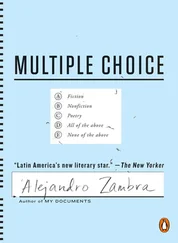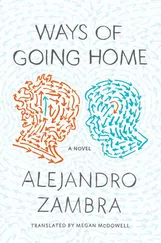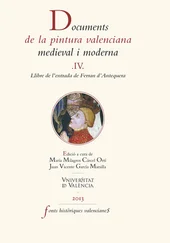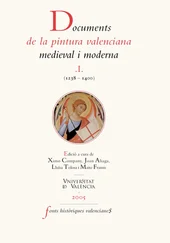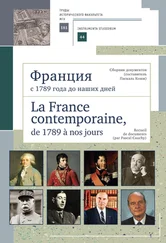When he comes back, the house is a disaster. Especially the second floor. He is annoyed that he is the author of the mess. He looks at the half-opened boxes, the clothes strewn across the bed, the many dolls, drawings, and bracelets scattered over the floor, the solitary LEGO blocks lost in corners. He thinks that he has profaned the space. He feels like a thief or a cop, and he even thinks of that horrible, excessive word: raid . He begins, reluctantly, to straighten up the room, but suddenly he stops, lights a cigarette, and blows some smoke rings like he used to do as a teenager, all while imagining that the little girl has just been playing here with her friends. He imagines he is the father who opens her door and indignantly demands she clean up her room, and that she nods but goes right on playing. He imagines going into the living room, where a very beautiful woman, a woman who is Consuelo, or who looks like Consuelo, hands him a mug of coffee, raises her eyebrows, and smiles, showing her teeth. Then he goes and makes that cup of coffee for himself, which he drinks in quick sips while he thinks about a life with children, a wife, a stable job. Martín feels a sharp jab in his chest. And then a word that is by now inevitable looms and conquers: melancholy .
He contents or distracts himself with the memory that he too, long ago, had been the father of a girl of the same age, seven. For a day, at least. He was nineteen and he lived in Recoleta with his father and his mother, neither of whom had gotten sick yet. One afternoon he went down to the kitchen and he heard Elba, the woman who helped around the house, complaining that she could never go to the parents’ meetings at her daughter’s school. He offered to go in her place, because he cared about Elba and Cami, but also out of a sense of adventure, which, in those days, was much more pronounced in him. He had long hair then and he looked very young — in no way did he look like a father — but he went into the school and sat at the back of the room next to a guy who was almost as young as him, although a little more of a man; more worldly, as they say.
On his right arm the man had a brown tattoo that was barely darker than his skin. It said: JESÚS.
“What’s your name?” Martín asked the man. He responded by indicating the tattoo. He seems nice, Martín thought.
“You look really young,” he told Martín.
“You too,” Martín said. “I was still a kid when I had my kid.” Just then the teacher closed the door and started to talk; some parents came in late and the door got stuck once, twice. None of the parents acknowledged this until a fat blond woman in the third row got up and, with an enviably resounding voice, interrupted the teacher: “How can this be? What would happen if there was an earthquake or a fire? What would become of the children?”
The teacher fell into the silence of one who knows she should think carefully about what she is going to say. It was precisely the moment when she could have blamed her bosses, the system, the municipalization of public education, Pinochet, the ineffectiveness of the Concertación party, capitalism — it was clearly not the teacher’s fault, but she didn’t think fast enough, she wasn’t brave: the voices accumulated and she let them build, everyone was complaining, everyone was shouting, and to make matters worse, right then someone else arrived late and the door jammed again. Even Martín was about to start yelling, but then the teacher asked that they show some respect and let her talk. “I’m sorry,” she said, “this is a poor school, we just don’t have the resources, I understand you are angry but keep in mind that if there is a fire or an earthquake, I’ll also be trapped in here with the children.” The effect of this grim observation lasted two or three seconds, until Martín got up furiously and pointed his finger at her and said, with a full sense of drama: “But you, ma’am, are not my daughter!” Everyone supported him, enraged, and he felt very good about himself.
“That was rad,” said Jesús later, congratulating him on the way to the bus. As they said good-bye, Martín asked him if he believed in Jesus. And Jesús responded with a smile: “I believe in Jesús.”
“You, ma’am, are not my daughter,” murmurs Martín now, like a mantra. That night he writes to Bruno, saying: All’s well .
One afternoon, on the way back from the supermarket, he finds that someone has put up posters right on top of the ones he made. He goes up and down the street and confirms that right where he’d posted his flyers, there are now signs announcing the disappearance of a Siberian and German mix named Pancho. There is a decent reward of twenty thousand pesos. Martín jots down the number and the name of Pancho’s owner: Paz.
There is a bottle of Jack Daniel’s in the kitchen. Martín drinks only beer or wine, he’s not used to liquor, but on a whim he pours a glass, and, with each sip, he discovers that he likes Jack Daniel’s, that he is spellbound by it. By the time he decides to call Paz, he’s fairly drunk. “You put your dog over my cat” is the first thing he says to her, awkwardly, vehemently.
It’s ten thirty at night. Paz seems surprised, but she says she understands the situation. He regrets his heated tone, and the conversation ends in charmless mutual apologies. Before hanging up, Martín catches a voice in the background, a complaint. A child’s voice.
The following morning Martín watches through the window as a young woman on a bicycle rides up and sets herself to the time-consuming task of moving the Pancho posters. He goes out to the street and looks at her from a certain distance — she isn’t beautiful, he thinks, decisively; she’s just young, she must be twenty years old, Martín could be her father (although he doesn’t think this last part).
Paz pulls down her posters and finds space for them above or below his. She disguises the torn corners by folding them, and, while she’s at it, she adjusts Martín’s posters, too. She works skillfully, and he wonders if she does this for a living. She must be part of a squad of lost-animal seekers, Martín thinks, like those people who professionally walk dogs. This is not the case.
He introduces himself and apologizes again for having called her so late. He accompanies her the rest of the way down the street. At first she seems reticent, but then the conversation begins to take shape. They talk about Mississippi and about Pancho and also about pets in general, about the responsibility of owning pets, and even about the word pet , which she doesn’t like because she finds it derogatory. Martín smokes several cigarettes while they talk, but he doesn’t want to toss the butts. He holds them in his hand as if they were valuable.
“There’s a trash can over there,” Paz tells him, suddenly, and the sentence coincides with the corner where they have to part ways.
That night he calls her and tells her that he’s covered dozens of blocks looking for Mississippi, and that he’s also kept an eye out for Pancho. It sounds like a lie, but it’s true. She thanks him for the gesture, but she doesn’t let the conversation flow from there. Martín begins to call her daily, and though the conversations stay short, he feels good about them, as if those few sentences will be enough to establish himself as a presence in her life.
A week later he sees a dog that looks like Pancho close to the house. He tries to approach it, but the dog runs away, scared. He calls Paz, but he has trouble talking. What he has to say sounds like a lie again, like an excuse to see her. But Paz accepts it. They meet and patrol the streets for a while, until it’s time for her to go pick her son up from kindergarten. Martín insists on going with her.
Читать дальше

